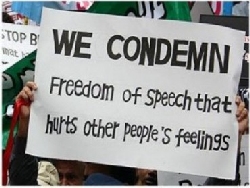- Has liberal humor gone too far?
Click for AUDIO VERSION.
To use this segment in a Radio broadcast or Podcast, send TIM a request.
 When it comes to humor in America, the age of subtlety disappeared a long time ago. Now, it's a matter of "in your face" comedy whereby innuendo has been replaced by shock. Desperate for laughs, comedians rely on bawdy vulgarities to entertain their audiences. This is particularly true today in political humor where people like CBS's Stephen Colbert and HBO's Bill Maher recently used vulgar sexual humor in reference to President Donald Trump.
When it comes to humor in America, the age of subtlety disappeared a long time ago. Now, it's a matter of "in your face" comedy whereby innuendo has been replaced by shock. Desperate for laughs, comedians rely on bawdy vulgarities to entertain their audiences. This is particularly true today in political humor where people like CBS's Stephen Colbert and HBO's Bill Maher recently used vulgar sexual humor in reference to President Donald Trump.
The question becomes, have we gone too far? Are such jokes designed to really be entertaining or just plain vicious? I understand the concept of free speech, but I also understand what is in bad taste.
Years ago, comedian Soupy Sales was thrown off the air for kiddingly asking his young viewers to take the change off of their parent's dressers and mail it to the station for the crew's holiday vacation. The FCC and his station wasted little time suspending him. A vulgarity like what is commonly heard on television today would have ended an entertainer's career back then. Not anymore.
The crude and vulgar humor of liberal comedians on television is the new norm, and the FCC is slow to reprimand such bad taste. They now say things about Mr. Trump nobody would dare say about Barack Obama without fear of retribution. Plain and simply, it is classless, devoid of good taste, and insolent. Even worse, it is not funny and represents a deterioration of our culture. Despicable behavior endears you to nobody other than your friends who think the same as you.
More importantly, it is not going unnoticed by independent voters who handed Mr. Trump the election last November. The Democrats are no longer a national party. Because of its liberal slant, it only appeals to bedrock liberals in New England, Miami, Chicago, western California, and Seattle. The Midwest, South, the northern industrial states, and the West are not amused by the liberal antics, and are more interested in seeing the country prosper economically and peacefully.
The obnoxious behavior of the liberal comedians stoke the flames of controversy and encourages others, such as protesters and anarchists, to take action. The result, we are no longer tolerant of the rights of others. Hence, liberal college students are emboldened to shout-down opposing opinions, or fire-bomb a building. Colbert and Maher may have hit a cord with their Democratic viewers but they are also encouraging them to be more antagonistic. It is this mindset which is going to ultimately cost the Democrats next year's mid-term elections. Obnoxious zealots are less likely to win political jobs than people who appear to be cool under pressure.
This is going to be a hard lesson for Democrats to learn. Until such time as the liberals can temper their fanaticism and appeal to the masses, not just the coasts, they will continue their death spiral. Then we will see who is laughing.
Also published in The Huffington Post.
Listen to Tim's interview on WWBA-AM.
Keep the Faith!
Note: All trademarks both marked and unmarked belong to their respective companies.
 Tim Bryce is a writer and the Managing Director of M&JB Investment Company (M&JB) of Palm Harbor, Florida and has over 40 years of experience in the management consulting field. He can be reached at timb001@phmainstreet.com
Tim Bryce is a writer and the Managing Director of M&JB Investment Company (M&JB) of Palm Harbor, Florida and has over 40 years of experience in the management consulting field. He can be reached at timb001@phmainstreet.com
For Tim's columns, see: timbryce.com
Like the article? TELL A FRIEND.
Copyright © 2017 by Tim Bryce. All rights reserved.
Also read Tim's columns in the THE HUFFINGTON POST
NEXT UP: TALKING WITH YOUR HANDS - Do we do it to excess?
LAST TIME: WISCONSIN'S "CAMPUS FREE SPEECH ACT" - Get ready for another showdown.
Listen to Tim on WZIG-FM (104.1) in Palm Harbor,FL; KIT-AM (1280) in Yakima, Washington "The Morning News" with hosts Dave Ettl & Lance Tormey (weekdays. 6:00-9:00am Pacific). Or tune-in to Tim's channel on YouTube. Click for TIM'S LIBRARY OF AUDIO CLIPS.
 Since childhood, many of us have been taught the concept of freedom of expression as contained in the 1st Amendment of the Bill of Rights, "Congress shall make no law respecting an establishment of religion, or prohibiting the free exercise thereof; or abridging the freedom of speech, or of the press; or the right of the people peaceably to assemble, and to petition the Government for a redress of grievances."
Since childhood, many of us have been taught the concept of freedom of expression as contained in the 1st Amendment of the Bill of Rights, "Congress shall make no law respecting an establishment of religion, or prohibiting the free exercise thereof; or abridging the freedom of speech, or of the press; or the right of the people peaceably to assemble, and to petition the Government for a redress of grievances." I recently snuck away for a little fly fishing in North Carolina with a couple of friends who happen to be illustrators, very respectable ones I might add. One is a personal friend I have known for many years and although we have different professional backgrounds, we inevitably talk about business. The art industry is a highly competitive field, probably because colleges have been churning out a glut of artists, illustrators, and graphic designers over the years. Compounding the problem is the computer which greatly leverages the ability of even the most mediocre talent. Frankly though, companies do not care whether a piece of artwork was created by hand or with computer assistance. They just want a graphic which will enhance an article, a magazine, a book, or whatever. This means the graphics business is not just competitive, but fiercely so.
I recently snuck away for a little fly fishing in North Carolina with a couple of friends who happen to be illustrators, very respectable ones I might add. One is a personal friend I have known for many years and although we have different professional backgrounds, we inevitably talk about business. The art industry is a highly competitive field, probably because colleges have been churning out a glut of artists, illustrators, and graphic designers over the years. Compounding the problem is the computer which greatly leverages the ability of even the most mediocre talent. Frankly though, companies do not care whether a piece of artwork was created by hand or with computer assistance. They just want a graphic which will enhance an article, a magazine, a book, or whatever. This means the graphics business is not just competitive, but fiercely so. People get fired from their jobs for a lot of reasons, such as a company struggling in today's economy, poor job performance, corporate politics, or even petty jealousies. Being fired is a real shot to the ego regardless of the reason. The first question one asks is, "Why?" Unfortunately, we don't always get the answer, maybe because companies are afraid of possible litigation resulting from the dismissal or they believe they are trying to let the worker down easily. Consequently, employees are dumbfounded as to why they were fired or are left with a fabricated excuse, which, to me, can be more damaging than the actual firing itself.
People get fired from their jobs for a lot of reasons, such as a company struggling in today's economy, poor job performance, corporate politics, or even petty jealousies. Being fired is a real shot to the ego regardless of the reason. The first question one asks is, "Why?" Unfortunately, we don't always get the answer, maybe because companies are afraid of possible litigation resulting from the dismissal or they believe they are trying to let the worker down easily. Consequently, employees are dumbfounded as to why they were fired or are left with a fabricated excuse, which, to me, can be more damaging than the actual firing itself. David Horowitz' new book, "BIG AGENDA - President Trump's Plan to Save America," has been receiving good reviews and is a bestseller on the New York Times list. In it, he outlines President Trump's plans to take back the country and reverse the Progressive agenda as put forth by President Obama, the Clintons, Senator Bernie Sanders, et al. From the outset, Horowitz makes it clear the country is at war with itself, something many of us have long known, but others should study, particularly Republicans.
David Horowitz' new book, "BIG AGENDA - President Trump's Plan to Save America," has been receiving good reviews and is a bestseller on the New York Times list. In it, he outlines President Trump's plans to take back the country and reverse the Progressive agenda as put forth by President Obama, the Clintons, Senator Bernie Sanders, et al. From the outset, Horowitz makes it clear the country is at war with itself, something many of us have long known, but others should study, particularly Republicans. It is an undocumented fact that the last 1% of anything takes longer than the other 99%. There are plenty of examples to support this argument, perhaps none quite as visible as the progress bars we see on computers. You know, those little bars telling you how you are progressing in the installation of software or the execution of a program. More often than not, such progress bars seem to race through the first 99% like a blazing track star, yet when we get to that last 1% it seems to slow down to a snail's pace.
It is an undocumented fact that the last 1% of anything takes longer than the other 99%. There are plenty of examples to support this argument, perhaps none quite as visible as the progress bars we see on computers. You know, those little bars telling you how you are progressing in the installation of software or the execution of a program. More often than not, such progress bars seem to race through the first 99% like a blazing track star, yet when we get to that last 1% it seems to slow down to a snail's pace. You can learn a lot from a supermarket. For example, if you want to know what a community is really like, visit the local supermarket. To me, it is a microcosm of the community, complete with local cuisine, customs, speech patterns, fashion, and social stature. It also tells us a lot about our driving skills. That's right, driving. The similarities between how people push their shopping carts in the store and how they motor around town is truly remarkable. Think about it, here's what you typically find as you meander the store aisles:
You can learn a lot from a supermarket. For example, if you want to know what a community is really like, visit the local supermarket. To me, it is a microcosm of the community, complete with local cuisine, customs, speech patterns, fashion, and social stature. It also tells us a lot about our driving skills. That's right, driving. The similarities between how people push their shopping carts in the store and how they motor around town is truly remarkable. Think about it, here's what you typically find as you meander the store aisles: Shortly after graduating from high school I went to work at a large amusement park in Cincinnati for a summer where I ran the cable car ride. I had a lot of smaller jobs while in school, but this was the first where I was exposed to the public on a grand scale. The amusement park provided instructional materials to try and prepare employees in dealing with the public, but I don't think anything truly prepares you for something like this other than to throw you right into it whereby you either sink or swim.
Shortly after graduating from high school I went to work at a large amusement park in Cincinnati for a summer where I ran the cable car ride. I had a lot of smaller jobs while in school, but this was the first where I was exposed to the public on a grand scale. The amusement park provided instructional materials to try and prepare employees in dealing with the public, but I don't think anything truly prepares you for something like this other than to throw you right into it whereby you either sink or swim. When I first went to Japan, I found it fascinating how so many people could get along in a small amount of space. For example, if you take the subway in Tokyo during rush hour, you better not be claustrophobic, as people are jammed in with you any way they can. Fortunately, I'm tall enough where I can keep my head above the fray and get some fresh air, but down below are Japanese pushed into my navel (and just about everywhere else). Remarkably, as close as the quarters are on the subway, the Japanese try to respect the privacy of the people surrounding them. I've always admired the Japanese for this; quite simply, there is great respect for the concern of others. Because of the small amount of available space, I guess they really have no alternative.
When I first went to Japan, I found it fascinating how so many people could get along in a small amount of space. For example, if you take the subway in Tokyo during rush hour, you better not be claustrophobic, as people are jammed in with you any way they can. Fortunately, I'm tall enough where I can keep my head above the fray and get some fresh air, but down below are Japanese pushed into my navel (and just about everywhere else). Remarkably, as close as the quarters are on the subway, the Japanese try to respect the privacy of the people surrounding them. I've always admired the Japanese for this; quite simply, there is great respect for the concern of others. Because of the small amount of available space, I guess they really have no alternative. I had a young friend recently ask me for advice on a critical sales presentation he was getting ready to make. He had prepared a good graphical presentation on the computer, but was still a little squeamish about speaking in front of a group of people. Knowing I had been through this many times in my career, he asked for some advice. My first question to him was, "How well do you know your subject?"
I had a young friend recently ask me for advice on a critical sales presentation he was getting ready to make. He had prepared a good graphical presentation on the computer, but was still a little squeamish about speaking in front of a group of people. Knowing I had been through this many times in my career, he asked for some advice. My first question to him was, "How well do you know your subject?" When I catch up with old friends through social media, particularly those from my youth, I am often asked something like, "Well Tim, how has your ride been?" In other words, have I had a good life? More importantly, knowing of my business background, they want to know what I have learned along the way, particularly in my field of endeavor, Information Technology.
When I catch up with old friends through social media, particularly those from my youth, I am often asked something like, "Well Tim, how has your ride been?" In other words, have I had a good life? More importantly, knowing of my business background, they want to know what I have learned along the way, particularly in my field of endeavor, Information Technology.
 I was recently talking to a young man in a local I.T. company who was lamenting how he was overlooked for a promotion. He had been with the company for a year, thought he was doing a good job, and fully expected to be promoted to a job at a higher pay level. He didn't get it. Somewhat miffed, he was considering jumping ship to look for another job elsewhere. In response, I asked him about the stability of the company and its future potential, which he admitted was good. I then asked what kind of assignments he had worked on over the last year and his success rate. Although he raved about his work effort, he admitted he had been late and over budget on some tasks, but was quick to proclaim, "I work my butt off in there; I put in 45 hours a week." I replied that managers are more interested in results, not necessarily the amount of time going into it. Frankly, 45 hours doesn't impress me and I told him so.
I was recently talking to a young man in a local I.T. company who was lamenting how he was overlooked for a promotion. He had been with the company for a year, thought he was doing a good job, and fully expected to be promoted to a job at a higher pay level. He didn't get it. Somewhat miffed, he was considering jumping ship to look for another job elsewhere. In response, I asked him about the stability of the company and its future potential, which he admitted was good. I then asked what kind of assignments he had worked on over the last year and his success rate. Although he raved about his work effort, he admitted he had been late and over budget on some tasks, but was quick to proclaim, "I work my butt off in there; I put in 45 hours a week." I replied that managers are more interested in results, not necessarily the amount of time going into it. Frankly, 45 hours doesn't impress me and I told him so.